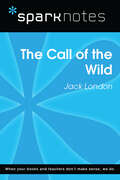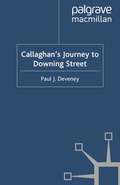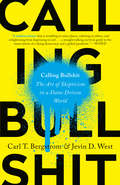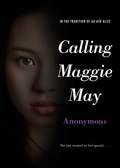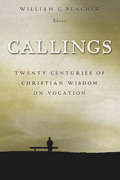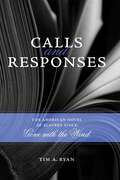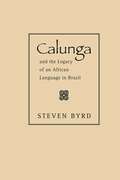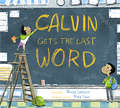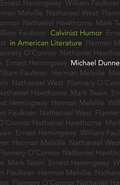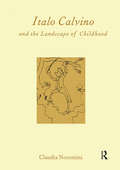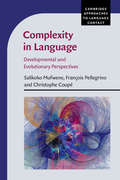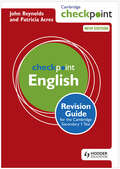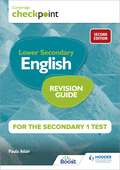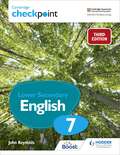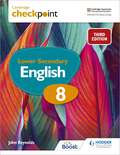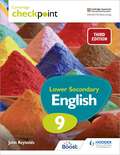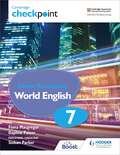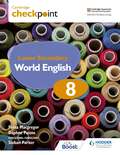- Table View
- List View
Call of the Wild (SparkNotes Literature Guide Series)
by SparkNotesCall of the Wild (SparkNotes Literature Guide) by Jack London Making the reading experience fun! Created by Harvard students for students everywhere, SparkNotes is a new breed of study guide: smarter, better, faster.Geared to what today's students need to know, SparkNotes provides:chapter-by-chapter analysis explanations of key themes, motifs, and symbols a review quiz and essay topicsLively and accessible, these guides are perfect for late-night studying and writing papers.
Callaghan's Journey to Downing Street
by P. DeveneyAn account of how one Labour Party politician, after suffering the biggest setback of his political career, used the anti-Vietnam War demonstrations in Grosvenor Square, the battle over trade union reform and the Troubles in Northern Ireland to propel himself to No 10.
Calling Bullshit: The Art of Skepticism in a Data-Driven World
by Carl T. Bergstrom Jevin D. WestBullshit isn&’t what it used to be. Now, two science professors give us the tools to dismantle misinformation and think clearly in a world of fake news and bad data. Misinformation, disinformation, and fake news abound and it&’s increasingly difficult to know what&’s true. Our media environment has become hyperpartisan. Science is conducted by press release. Startup culture elevates bullshit to high art. We are fairly well equipped to spot the sort of old-school bullshit that is based in fancy rhetoric and weasel words, but most of us don&’t feel qualified to challenge the avalanche of new-school bullshit presented in the language of math, science, or statistics. In Calling Bullshit, Professors Carl Bergstrom and Jevin West give us a set of powerful tools to cut through the most intimidating data. You don&’t need a lot of technical expertise to call out problems with data. Are the numbers or results too good or too dramatic to be true? Is the claim comparing like with like? Is it confirming your personal bias? Drawing on a deep well of expertise in statistics and computational biology, Bergstrom and West exuberantly unpack examples of selection bias and muddled data visualization, distinguish between correlation and causation, and examine the susceptibility of science to modern bullshit. We have always needed people who call bullshit when necessary, whether within a circle of friends, a community of scholars, or the citizenry of a nation. Now that bullshit has evolved, we need to relearn the art of skepticism.
Calling Maggie May (Anonymous Diaries)
by AnonymousA dark and edgy first-person cautionary tale about how one girl’s seemingly minor choices quickly spiraled into a life as a sex worker in the tradition of Go Ask Alice and Lucy in the Sky.She had a normal life, until one small decision changed everything. Suddenly, there were new possibilities and new experiences.But not all of those experiences were good.Read her shocking story in the diary she left behind.
Callings: Twenty Centuries of Christian Wisdom on Vocation
by William C. PlacherWhat am I going to do with my life? is a question that young people commonly face, while many not-so-young people continue to wonder about finding direction and purpose in their lives. Whether such purpose has to do with what job to take, whether to get married, or how to incorporate religious faith into the texture of their lives, Christians down the centuries have believed that God has plans for them. This unprecedented anthology gathers select passages on work and vocation from the greatest writers in Christian history. William Placher has written insightful introductions to accompany the selections — an introduction to each of the four main historical sections and a brief introduction to each reading. While the vocational questions faced by Christians have changed through the centuries, this book demonstrates how the distilled wisdom of these saints, preachers, theologians, and teachers remains relevant to Christians today. This rich resource is to be followed by a companion volume, edited by Mark R. Schwehn and Dorothy C. Bass, featuring texts drawn mainly from fiction, memoir, poetry, and other forms of literature. A study guide is available from Programs for the Theological Exploration of Vocation (PTEV) on their website: www.ptev.org
Calls and Responses: The American Novel of Slavery since Gone with the Wind (Southern Literary Studies)
by Tim A. RyanIn this comprehensive, groundbreaking study, Tim A. Ryan explores how American novelists since World War I have imagined the institution of slavery and the experience of those involved in it. Complicating the common assumption that authentic black-authored fiction about slavery is starkly opposed to the traditional, racist fiction (and history) created by whites, Ryan suggests that discourses about American slavery are -- and have always been -- defined by connections rather than disjunctions. Ryan contends that African American writers didn't merely reject and move beyond traditional portrayals of the black past but rather actively engaged in a dynamic dialogue with white-authored versions of slavery and existing historiographical debates. The result is an ongoing cultural conversation that transcends both racial and disciplinary boundaries and is akin to the call-and-response style of African American gospel music.Ryan addresses in detail more than a dozen major American novels of slavery, from the first significant modern fiction about the institution -- Margaret Mitchell's Gone with the Wind and Arna Bontemps's Black Thunder (both published in 1936) -- to recent noteworthy novels on the topic -- Edward P. Jones's The Known World and Valerie Martin's Property (both published in 2003). His insistence upon the necessity of interpreting novels about the past directly in relation to specific historical scholarship makes Calls and Responses especially compelling. He reads Toni Morrison's Beloved not in opposition to a monolithic orthodoxy about slavery but in relation to specific arguments of controversial historian Stanley Elkins. Similarly, he analyzes William Styron's The Confessions of Nat Turner in terms of its rhetorical echoes of Frederick Douglass's famous autobiographical narrative. Ryan shows throughout Calls and Responses how a variety of novelists -- including Alex Haley, Octavia Butler, Ishmael Reed, Margaret Walker, and Frances Gaither -- engage in a dynamic debate with each other and with such historians as Herbert Aptheker, Charles Joyner, Eugene and Elizabeth Genovese, and many others.A substantially new account of the development of American slavery fiction in the last century, Calls and Responses goes beyond merely exalting the expression of black voices and experiences and actually reconfigures the existing view of the American novel of slavery.
Calunga and the Legacy of an African Language in Brazil
by Steven ByrdAlthough millions of slaves were forcibly transported from Africa to Brazil, the languages the slaves brought with them remain little known. Most studies have focused on African contributions to Brazilian Portuguese rather than on the African languages themselves. This book is unusual in focusing on an African-descended language. The author describes and analyzes the Afro- Brazilian speech community of Calunga, in Minas Gerais. Linguistically descended from West African Bantu, Calunga is an endangered Afro-Brazilian language spoken by a few hundred older Afro-Brazilian men, who use it only for specific, secret communications. Unlike most creole languages, which are based largely on the vocabulary of the colonial language, Calunga has a large proportion of African vocabulary items embedded in an essentially Portuguese grammar. A hyrid language, its formation can be seen as a form of cultural resistance.Steven Byrd&’s study provides a comprehensive linguistic description of Calunga based on two years of interviews with speakers of the language. He examines its history and historical context as well as its linguistic context, its sociolinguistic profile, and its lexical and grammatical outlines.
Calvin's Last Word
by Margo SorensonThe dictionary as narrator? YES! <P><P> Calvin's dictionary is proud to be carried everywhere Calvin goes--the breakfast table, school, baseball practice, and home again--because Calvin is determined to find the perfect word to attach to his annoying older brother. The word isn’t exactly revenge, mayhem, bewilderment, subterfuge, pulverize, or even retaliation, though all those words are so close and very tempting. When Calvin finally finds the right word for his rascally brother, his dictionary is surprised and delighted, and readers will enjoy celebrating the triumphant discovery of Calvin's perfect word along with his dictionary.
Calvinist Humor in American Literature
by Michael DunneThough the phrase "Calvinist humor" may seem to be an oxymoron, Michael Dunne, in highly original and unfailingly interesting readings of major American fiction writers, uncovers and traces two recurrent strands of Calvinist humor descending from Puritan times far into the twentieth century. Calvinist doctrine views mankind as fallen, apt to engage in any number of imperfect behaviors. Calvinist humor, Dunne explains, consists in the perception of this imperfection. When we perceive that only others are imperfect, we participate in the form of Calvinist humor preferred by William Bradford and Nathanael West. When we perceive that others are imperfect, as we all are, we participate in the form preferred by Mark Twain and William Faulkner, for example. Either by noting their characters' inferiority or by observing ways in which we are all far from perfect, Dunne observes, American writers have found much to laugh about and many occasions for Calvinist humor.The two strains of Calvinist humor are alike in making the faults of others more important than their virtues. They differ in terms of what we might think of as the writer/perceiver's disposition: his or her willingness to recognize the same faults in him- or herself. In addition to Bradford, West, Twain and Faulkner, Dunne discovers Calvinist humor in the works of Flannery O'Connor, Herman Melville, Nathaniel Hawthorne, Ernest Hemingway, and many others. For these authors, the world -- and thus their fiction -- is populated with flawed creatures. Even after belief in orthodox Calvinism diminished in the twentieth century, Dunne discovers, American writers continued to mine these veins, irrespective of the authors' religious affiliations -- or lack of them. Dunne notes that even when these writers fail to accept the Calvinist view wholeheartedly, they still have a tendency to see some version of Calvinism as more attractive than an optimistic, idealistic view of life.With an eye for the telling detail and a wry humor of his own, Dunne clearly demonstrates that the fundamental Calvinist assumption -- that human beings are fallen from some putatively better state -- has had a surprising, lingering presence in American literature.
Calvino and the Landscape of Childhood
by Claudia Nocentini (Lecturer in Italian, University of Edinburgh)"Although never named as such, the landscape of Sanremo was a visual source for Calvino's fiction. This recurring theme provides both a link between some very different works and an insight into the autobiographical dimension of an author whose attitude to privacy is protective but detached. This work is an analysis of the criteria of representative (and of representational distortion) of a descriptive motif."
Cambridge Approaches to Language Contact: Complexity in Language
by Salikoko Mufwene Christophe Coupé François PellegrinoThe question of complexity, as in what makes one language more 'complex' than another, is a long-established topic of debate amongst linguists. Recently, this issue has been complemented with the view that languages are complex adaptive systems, in which emergence and self-organization play major roles. However, few students of the phenomenon have gone beyond the basic assessment of the number of units and rules in a language (what has been characterized as 'bit complexity') or shown some familiarity with the science of complexity. This book reveals how much can be learned by overcoming these limitations, especially by adopting developmental and evolutionary perspectives. The contributors include specialists of language acquisition, evolution and ecology, grammaticization, phonology, and modeling, all of whom approach languages as dynamical, emergent, and adaptive complex systems.
Cambridge Approaches to Language Contact: Language Contact in Europe
by Bridget DrinkaThis comprehensive new work provides extensive evidence for the essential role of language contact as a primary trigger for change. Unique in breadth, it traces the spread of the periphrastic perfect across Europe over the last 2,500 years, illustrating at each stage the micro-responses of speakers and communities to macro-historical pressures. Among the key forces claimed to be responsible for normative innovations in both eastern and western Europe is 'roofing' - the superstratal influence of Greek and Latin on languages under the influence of Greek Orthodoxy and Roman Catholicism respectively. The author provides a new interpretation of the notion of 'sprachbund', presenting the model of a three-dimensional stratified convergence zone, and applies this model to her analysis of the have and be perfects within the Charlemagne sprachbund. The book also tackles broader theoretical issues, for example, demonstrating that the perfect tense should not be viewed as a universal category.
Cambridge Approaches to Language Contact: The Emergence of Hybrid Grammars
by Enoch Oladé AbohChildren are extremely gifted in acquiring their native languages, but languages nevertheless change over time. Why does this paradox exist? In this study of creole languages, Enoch Aboh addresses this question, arguing that language acquisition requires contact between different linguistic sub-systems that feed into the hybrid grammars that learners develop. There is no qualitative difference between a child learning their language in a multilingual environment and a child raised in a monolingual environment. In both situations, children learn to master multiple linguistic sub-systems that are in contact and may be combined to produce new variants. These new variants are part of the inputs for subsequent learners. Contributing to the debate on language acquisition and change, Aboh shows that language learning is always imperfect: learners' motivation is not to replicate the target language faithfully but to develop a system close enough to the target that guarantees successful communication and group membership.
Cambridge Approaches to Language Contact: The Making of Vernacular Singapore English
by Zhiming BaoSingapore English is a focal point across the many subfields of linguistics, as its semantic, syntactic and phonetic/phonological qualities tell us a great deal about what happens when very different types of language come together. Sociolinguists are also interested in the relative status of Singapore English compared to other languages in the country. This book charts the history of Singapore English and explores the linguistic, historical and social factors that have influenced the variety as it is spoken today. It identifies novel grammatical features of the language, discusses their structure and function, and traces their origins to the local languages of Singapore. It places grammatical system and usage at the core of analysis, and shows that introspective and corpus data are complementary. This study will be of interest to scholars and advanced students working on language contact, world varieties of English, historical linguistics and sociolinguistics.
Cambridge Checkpoint English Revision Guide for the Cambridge Secondary 1 Test
by John Reynolds Patricia AcresWith Checkpoint English Revision Guide for the Cambridge Secondary 1 test you can aim for the best grade with the help of relevant and accessible notes, examiner advice plus questions and answers on each key topic. - Clear explanations of every topic covered in the Cambridge Secondary 1 Checkpoint English syllabus - Builds revision skills you need for success in the test - Exam tips wirtten by test setters and examiners giving you their expert advice This text has not been through the Cambridge endorsement process.
Cambridge Checkpoint English Revision Guide for the Cambridge Secondary 1 Test
by John Reynolds Patricia AcresWith Checkpoint English Revision Guide for the Cambridge Secondary 1 test you can aim for the best grade with the help of relevant and accessible notes, examiner advice plus questions and answers on each key topic. - Clear explanations of every topic covered in the Cambridge Secondary 1 Checkpoint English syllabus - Builds revision skills you need for success in the test - Exam tips wirtten by test setters and examiners giving you their expert advice This text has not been through the Cambridge endorsement process.
Cambridge Checkpoint Lower Secondary English Revision Guide for the Secondary 1 Test 2nd edition
by Paula AdairAchieve maximum potential using step-by-step guidance that helps to practise skills learned and improve exam technique. - Build confidence with practical study tips and effective revision strategies. - Reinforce understanding with clear explanations of every topic covered in the Cambridge Lower Secondary Checkpoint English curriculum framework, including Spelling, Grammar and Vocabulary. - Strengthen and test knowledge using a range of poetry, fiction and non-fiction texts with related questions and worked examples. Answers to the practice test papers are available free online at www.hoddereducation.com/cambridgeextras
Cambridge Checkpoint Lower Secondary English Revision Guide for the Secondary 1 Test 2nd edition
by Paula AdairAchieve maximum potential using step-by-step guidance that helps to practise skills learned and improve exam technique. - Build confidence with practical study tips and effective revision strategies. - Reinforce understanding with clear explanations of every topic covered in the Cambridge Lower Secondary Checkpoint English curriculum framework, including Spelling, Grammar and Vocabulary. - Strengthen and test knowledge using a range of poetry, fiction and non-fiction texts with related questions and worked examples. Answers to the practice test papers are available free online at www.hoddereducation.com/cambridgeextras
Cambridge Checkpoint Lower Secondary English Student's Book 7: Third Edition
by John ReynoldsStage 7 has been endorsed by Cambridge Assessment International Education.Put your trust in a market-leading approach that has been used by teachers for over 10 years.Written by experienced author John Reynolds, Cambridge Checkpoint Lower Secondary English offers full coverage of the new Cambridge Lower Secondary English curriculum framework (0861). - Boost confidence and test understanding: Questions within the chapters will help consolidate learning, directing learners to pause and think about what they've read, written or discussed whilst exam-style questions will help develop confidence in preparation for Cambridge Lower Secondary Checkpoint.- Develop key concepts and skills: Information on the key skills such as grammar, punctuation, parts of speech and their functions, vocabulary and spelling is provided with linked exercises to practise these skills.- Engage learners and extend understanding: Cultivate a love of reading with diverse and wide-ranging texts to inspire learners on their reading journey, with carefully chosen discussion and reflection points for each topic.- Cater for all learners: With a series that has been written to ensure language is appropriate for learners from around the world.
Cambridge Checkpoint Lower Secondary English Student's Book 7: Third Edition
by John ReynoldsStage 7 has been endorsed by Cambridge Assessment International Education.Put your trust in a market-leading approach that has been used by teachers for over 10 years.Written by experienced author John Reynolds, Cambridge Checkpoint Lower Secondary English offers full coverage of the new Cambridge Lower Secondary English curriculum framework (0861). - Boost confidence and test understanding: Questions within the chapters will help consolidate learning, directing learners to pause and think about what they've read, written or discussed whilst exam-style questions will help develop confidence in preparation for Cambridge Lower Secondary Checkpoint.- Develop key concepts and skills: Information on the key skills such as grammar, punctuation, parts of speech and their functions, vocabulary and spelling is provided with linked exercises to practise these skills.- Engage learners and extend understanding: Cultivate a love of reading with diverse and wide-ranging texts to inspire learners on their reading journey, with carefully chosen discussion and reflection points for each topic.- Cater for all learners: With a series that has been written to ensure language is appropriate for learners from around the world.
Cambridge Checkpoint Lower Secondary English Student's Book 8: Third Edition
by John ReynoldsWe are working with Cambridge Assessment International Education to gain endorsement for this forthcoming title.Put your trust in a market-leading approach that has been used by teachers for over 10 years.Written by experienced author John Reynolds, Cambridge Checkpoint Lower Secondary English offers full coverage of the new Cambridge Lower Secondary English curriculum framework (0861). - Boost confidence and test understanding: Questions within the chapters will help consolidate learning, directing learners to pause and think about what they've read, written or discussed whilst exam-style questions will help develop confidence in preparation for Cambridge Lower Secondary Checkpoint.- Develop key concepts and skills: Information on the key skills such as grammar, punctuation, parts of speech and their functions, vocabulary and spelling is provided with linked exercises to practise these skills.- Engage learners and extend understanding: Cultivate a love of reading with diverse and wide-ranging texts to inspire learners on their reading journey, with carefully chosen discussion and reflection points for each topic.- Cater for all learners: With a series that has been written to ensure language is appropriate for learners from around the world.
Cambridge Checkpoint Lower Secondary English Student's Book 9 Third Edition
by John ReynoldsThis series has been endorsed by Cambridge International to support the curriculum framework from 2020.Put your trust in a market-leading approach that has been used by teachers for over 10 years.Written by experienced author John Reynolds, Cambridge Checkpoint Lower Secondary English offers full coverage of the new Cambridge Lower Secondary English curriculum framework (0861). - Boost confidence and test understanding: Questions within the chapters will help consolidate learning, directing learners to pause and think about what they've read, written or discussed whilst exam-style questions will help develop confidence in preparation for Cambridge Lower Secondary Checkpoint.- Develop key concepts and skills: Information on the key skills such as grammar, punctuation, parts of speech and their functions, vocabulary and spelling is provided with linked exercises to practise these skills.- Engage learners and extend understanding: Cultivate a love of reading with diverse and wide-ranging texts to inspire learners on their reading journey, with carefully chosen discussion and reflection points for each topic.- Cater for all learners: With a series that has been written to ensure language is appropriate for learners from around the world.
Cambridge Checkpoint Lower Secondary World English Student's Book 7
by Daphne Paizee Fiona MacgregorWe are working with Cambridge Assessment International Education to gain endorsement for this forthcoming title.This series offers full coverage of the learning objectives for the Cambridge Lower Secondary English as a Second language curriculum framework (0876) and is mapped to the Common European Framework of Reference.- Stimulate learners with model texts and a range of activities to develop skills, knowledge and comprehension.- Revisit previous knowledge with the 'Do you remember?' feature to recap topics and activate schema, along with practice tasks, exercises and 'Challenge yourself' activities to consolidate learning. - Clearly address the key objectives: reading, writing, speaking, listening and use of English.- Support activities and knowledge covered in the Student's Book with the accompanying Workbook and Teacher's Guide with Boost subscription.
Cambridge Checkpoint Lower Secondary World English Student's Book 7
by Daphne Paizee Fiona MacgregorCheckpoint World English Stage 7 has been endorsed by Cambridge Assessment International Education.This series offers full coverage of the learning objectives for the Cambridge Lower Secondary English as a Second language curriculum framework (0876) and is mapped to the Common European Framework of Reference.- Stimulate learners with model texts and a range of activities to develop skills, knowledge and comprehension.- Revisit previous knowledge with the 'Do you remember?' feature to recap topics and activate schema, along with practice tasks, exercises and 'Challenge yourself' activities to consolidate learning. - Clearly address the key objectives: reading, writing, speaking, listening and use of English.- Support activities and knowledge covered in the Student's Book with the accompanying Workbook and Teacher's Guide with Boost subscription.- Audio files are available free at https://www.hoddereducation.co.uk/cambridgeextras
Cambridge Checkpoint Lower Secondary World English Student's Book 8
by Daphne Paizee Fiona MacgregorCheckpoint World English Stage 8 has been endorsed by Cambridge Assessment International Education.This series offers full coverage of the learning objectives for the Cambridge Lower Secondary English as a Second language curriculum framework (0876) and is mapped to the Common European Framework of Reference.- Stimulate learners with model texts and a range of activities to develop skills, knowledge and comprehension.- Revisit previous knowledge with the 'Do you remember?' feature to recap topics and activate schema, along with practice tasks, exercises and 'Challenge yourself' activities to consolidate learning. - Clearly address the key objectives: reading, writing, speaking, listening and use of English.- Support activities and knowledge covered in the Student's Book with the accompanying Workbook and Teacher's Guide with Boost subscription.
